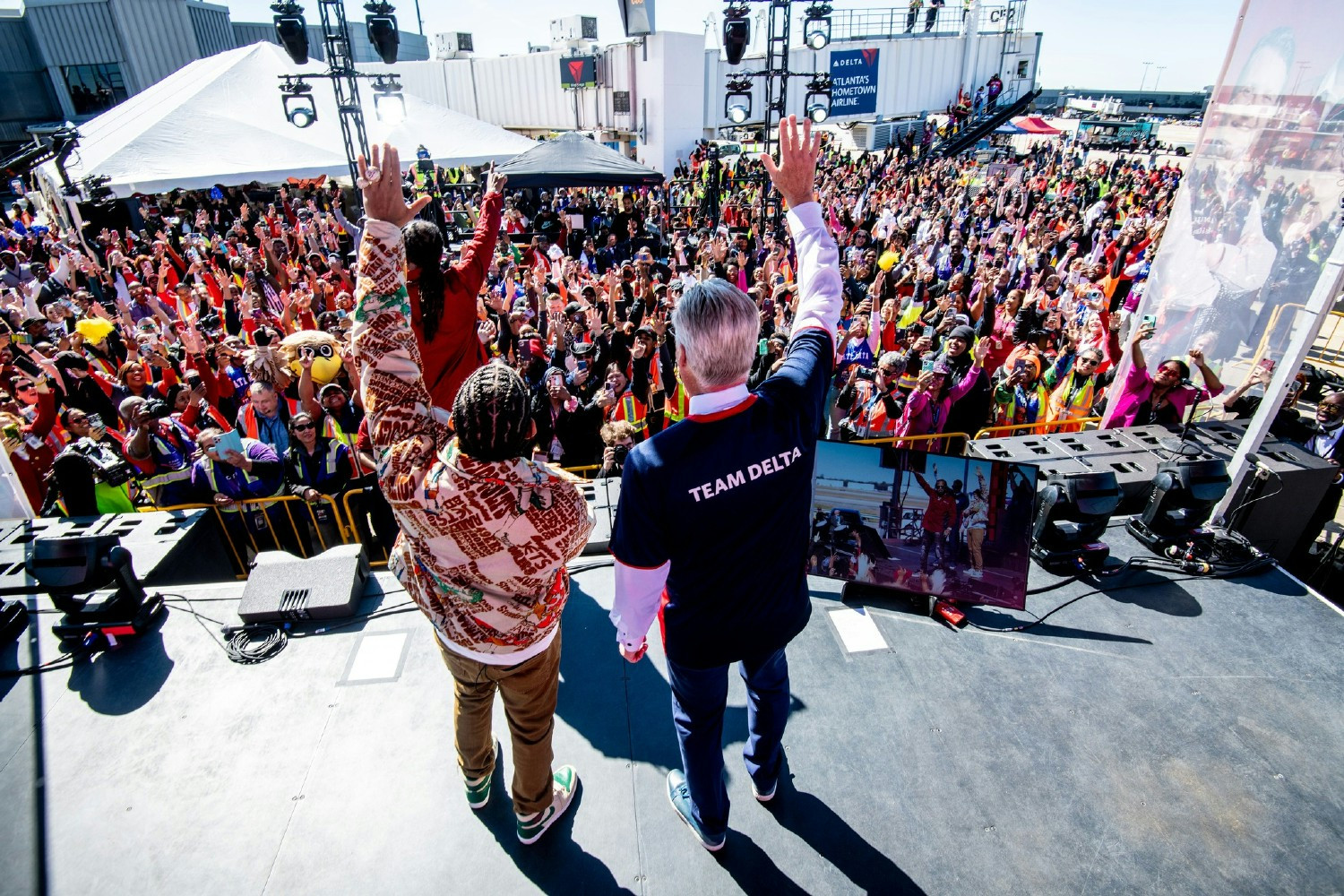Benefits of Company Culture, Best Workplaces
The global aviation company stands out, not only for sharing $1.4 billion of its profits with employees, but also for robust programs to help every team member build their career.
How your employees feel about their work has a direct impact on financial performance.
Just ask Delta Air Lines, where a people-first culture drives industry-leading customer service, a significant reason why the Atlanta-based brand was the most profitable airline in America last year.
“Everything starts with our people,” says Toby Broberg, managing director of global talent management at Delta Air Lines. “We know that when we invest in our people and the employee experience, they bring their best selves to work. In turn, they take care of our customers and keep our customers coming back again and again.”
How employee experience drives business performance
Delta measures this effect in its net promoter score (NPS), an industry metric that evaluates whether customers would recommend their experience with a company’s services.
“We believe 24% of our NPS is driven by employee interactions with our customers,” Broberg says. “Higher NPS is directly tied to higher revenue.”
As a result, Delta generates 14% more revenue per “seat mile” than its competitors, an advantage it maintains by offering stronger customer service and reliability. In North America, Delta’s flights arrived on schedule 84% of the time in 2024, the seventh year in a row Delta topped the industry.
Such a performance wouldn’t be possible without the commitment of its 100,000 employees who operate in 55 countries globally, flying more than 4,000 flights a day. Average seniority for employees at the airline is 13 years, a testament to its ability to retain skilled talent despite the ups and downs of the travel industry in the COVID era.
Nearly nine in 10 Delta employees (89%) say they want to work at Delta for a long time, according to the company’s most recent Great Place To Work® survey. That’s four points higher than the average for the Fortune 100 Best Companies to Work For® in 2025.
Improved employee survey scores propelled Delta to No. 15 on the list, up 79 spots from last year. The climb is a testament to years of hard work to build a culture where employees find their purpose in the skies.
Benchmark your company performance against leaders like Delta with Great Place To Work's research-backed survey.
Making leaders accessible
One remarkable practice for an organization of Delta’s size is the employee engagement sessions called “VELVET” that it holds with frontline employees — a nod to bringing employees “behind the velvet rope.”
Started in 2006 when Delta was in bankruptcy, the meetings were designed to give employees the opportunity to connect with senior leaders and have continued ever since. This year, 10% of frontline employees in the U.S. will participate in a VELVET — about 10,000 people.
“It allows our frontline employees to meet and hear directly from our senior leaders,” Broberg says. “They share their feedback, which helps shape our company’s future and our business strategies.”
The meetings are also opportunities for employees to participate in career development and training programs.
This commitment to communication and listening is a core part of Delta’s talent strategy. On top of VELVET, Delta leaders hold town halls in airports across the country where executives meet with frontline employees — not just at Delta’s major hubs like Atlanta, but in smaller stations as well.
“Asking our people how we can support them and then taking meaningful action is critical to our culture,” Broberg says.
Profit sharing inspires employees
Perhaps the most dramatic way Delta outperforms the Fortune 100 Best is on measures of profit sharing, where eight in 10 employees (80%) say they get a fair share of company profits. That’s 13 points higher than the average for the 100 Best. It’s an impressive result for a company with such a complex workforce of pilots, flight attendants, gate agents, support staff, and more.
Fortune reports that Delta’s profit-sharing program is the most generous of any major U.S. company, with employees each year receiving 10% of Delta’s first $2.5 billion in adjusted profits and 20% of anything after that. In 2024, employees received about $1.4 billion, equivalent to every eligible employee receiving 10% of their base pay.
However, pay alone isn’t what drives employees’ loyalty. Fair pay only increases intent to stay by 54%, per analysis of 1.3 million employee surveys from Great Place To Work Certified™ companies. But Great Place To Work data shows that having meaningful work makes employees nearly four times more likely to want to stay in their job.
Delta makes every role more meaningful by investing in development opportunities for employees across the organization.
A skills-based approach to talent
Delta has been at the forefront of efforts to increase opportunities for employees, eliminating college degree requirements for 90% of positions.
“There’s research that says that hiring based on skills is five times more likely to predict job performance,” Broberg says.
Delta is committed to internal learning and education, and elevating leaders who embrace curiosity about every aspect of the business. Employees at Delta are always learning, and leaders are expected to learn from frontline employees just as much as they mentor and train in the other direction.
Programs like “Behind the Wings” — an immersion program where leaders engage with customers directly alongside frontline teams to understand their roles and experiences — help ensure that Delta’s culture remains connected to the experiences of people on the ground.
“It is invaluable to understand, when you’re making decisions or when you’re creating business strategies, how it’s actually working at the airports,” Broberg says. Leaders shadow frontline employees at the baggage drop desk or the ticket counter, getting a firsthand view of the challenges the business faces.
Leaders are not assigned to participate, but instead raise their hands, another testament to Delta’s culture. In the past year, 5,500 employees volunteered to spend 23,000 hours immersing themselves in the frontline operations of the company. That’s what it means to be a leader at the most profitable airline in the country.
Measuring the impact of development programs
It’s not just leaders who participate in cross-training programs. Frontline employees at Delta developed their own idea for a program, called “A Day in the Life,” which allows different job roles to shadow another function at Delta. Flight attendants and gate agents can shadow each other, for example, to understand the other’s job and the challenges that typically come up.
“Picture you’re working an oversold flight,” Broberg says. “The flight attendants get to understand the pre-boarding processes that they perhaps aren’t seeing because they’re on the plane preparing for our customers. Then in reverse, our gate agents spend time with the flight attendants, understanding their roles and the often-competing priorities.”
The result? More than nine in 10 (96%) of participants report learning specific details about job roles that were surprising to them, and 90% agreed that understanding those organizational processes helps their ability to work effectively.
Employee surveys are essential tools for understanding the impact of these programs and how employee experience drives better business outcomes.
“We do a lot of listening,” Broberg says, including monthly pulse check surveys on top of annual engagement surveys.
How do you ensure employees see the value in participating in such a large volume of surveys? It all comes down to taking action, Broberg says — “making sure that as we’re listening, we’re responding, and we are demonstrating to them every day that their voice matters.”
Turn culture insights into business wins
Let the Trust Index™ Survey reveal your workplace’s hidden strengths and areas for growth. Start transforming today.







